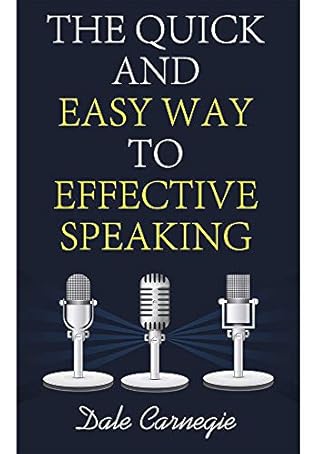More on this book
Community
Kindle Notes & Highlights
Read between
October 15 - December 15, 2021
Concentrate your attention on what self-confidence and the ability to talk more effectively will mean to you.
“The biggest lesson I have ever learned is the stupendous importance of what we think. If I knew what you think, I would know what you are, for your thoughts make you what you are. By changing our thoughts, we can change our lives.”
The man who writes out and memorizes his talks is wasting his time and energy, and courting disaster.
All our lives we have been speaking spontaneously. We haven’t been thinking of words. We have been thinking of ideas. If our ideas are clear, the words come as naturally and unconsciously as the air we breathe.
Assemble And Arrange Your Ideas Beforehand: What, then, is the proper method of preparing a talk? Simply this: search your background for significant experiences that have taught you something about life, and assemble your thoughts, your ideas, your convictions, that have welled up from these experiences.
Lose Yourself In Your Subject: After you have selected your subject, arranged it according to plan, and rehearse it by “talking it out” with your friends, your preparation is not ended. You must sell yourself on the importance of your subject. You must have the attitude that has inspired all the truly great personages of history—a belief in your cause. How do you fan the fires of faith in your message? By exploring all phases of your subject, grasping its deeper meanings, and asking yourself how your talk will help the audience to be better people for having listened to you.
Draw yourself up to your full height and look your audience straight in the eyes, and begin to talk as confidently as if every one of them owed you money.
Speak About Something You Have Earned The Right To Talk About Through Experience Or Study
Speak on what life has taught you and I will be your devoted listener.
The effective speaker earnestly desires his listeners to feel what he feels, to agree with his point of view, to do what he thinks is right for them to do, and to enjoy and relive his experience with him. He is audience-centered and not self-centered. He knows that the success or failure of his talk is not for him to decide—it will be decided in the minds and hearts of his hearers.
then the next step is to ask yourself questions that will deepen your understanding and prepare you to talk with authority on the topic you have chosen: “Why do I believe this? When did I ever see this point exemplified in real life? What precisely am I trying to prove? Exactly how did it happen?”
“I always try to get ten times as much information as I use, sometimes a hundred times as much,” said John Gunther not long ago.
“If a speech is to be of any importance at all, the speaker should live with the theme or message, turning it over and over in his mind. He will be surprised at how many useful illustrations or ways of putting his case will come to him as he walks the street, or reads a newspaper, or gets ready for bed, or wakes up in the morning. Mediocre speaking very often is merely the inevitable and the appropriate reflection of mediocre thinking, and the consequence of imperfect acquaintance with the subject in hand.”
“Nothing adds more realism to a story than names; nothing is as unrealistic as anonymity. Imagine a story whose hero has no name.”
If you can’t write your message in a sentence, you can’t say it in an hour. —Dianna Booher
Tell the audience what you’re going to say, say it; then tell them what you’ve said. —Dale Carnegie
Vitality, aliveness, enthusiasm—these are the first qualities I have always considered essential in a speaker.
If a speaker believes a thing earnestly enough and says it earnestly enough, he will get adherents to his cause
There are four ways, and only four ways, in which we have contact with the world. We are evaluated and classified by these four contacts: what we do, how we look, what we say, and how we say it. —Dale Carnegie
regardless of whether the speaker realizes it or not, has one of four major goals. What are they? 1. To persuade or get action. 2. To inform. 3. To impress and convince. 4. To entertain.


